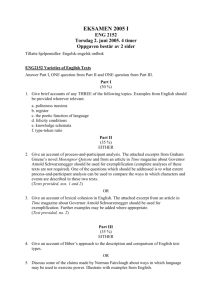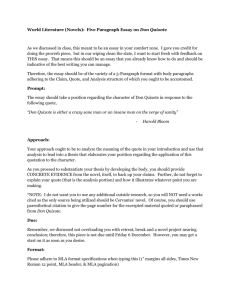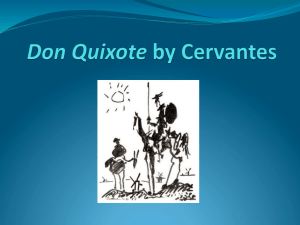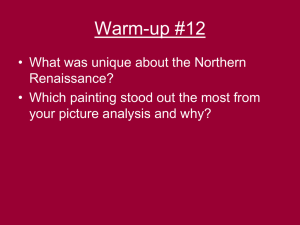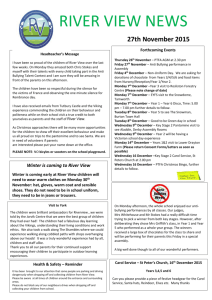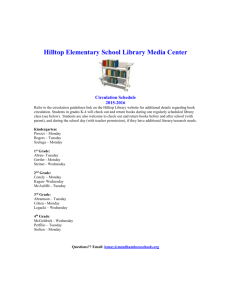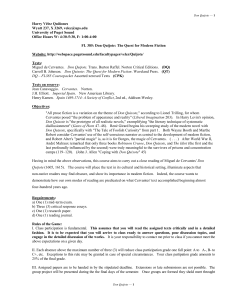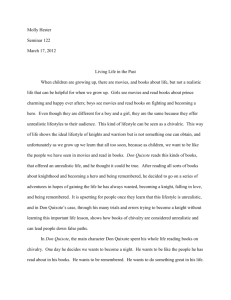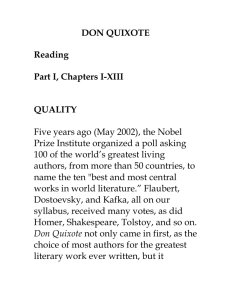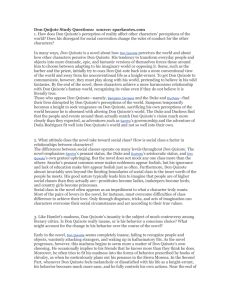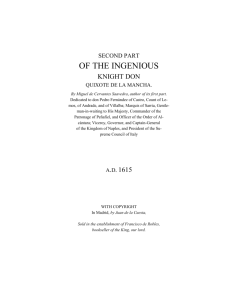Syllabus
advertisement
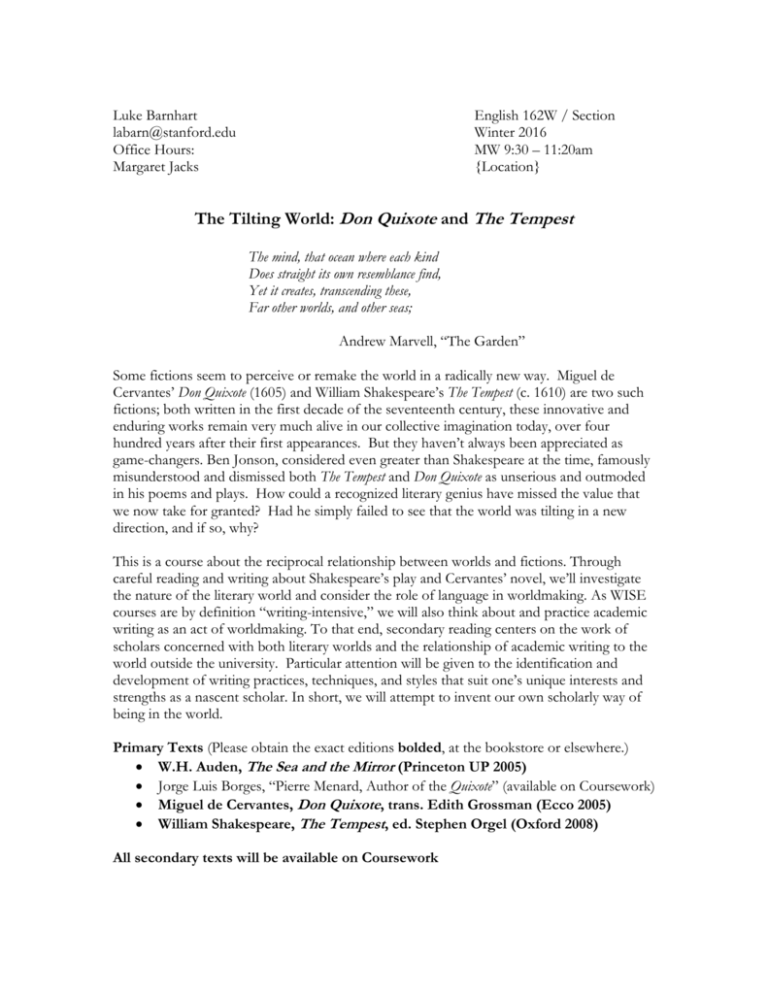
Luke Barnhart
labarn@stanford.edu
Office Hours:
Margaret Jacks
English 162W / Section
Winter 2016
MW 9:30 – 11:20am
{Location}
The Tilting World: Don Quixote and The Tempest
The mind, that ocean where each kind
Does straight its own resemblance find,
Yet it creates, transcending these,
Far other worlds, and other seas;
Andrew Marvell, “The Garden”
Some fictions seem to perceive or remake the world in a radically new way. Miguel de
Cervantes’ Don Quixote (1605) and William Shakespeare’s The Tempest (c. 1610) are two such
fictions; both written in the first decade of the seventeenth century, these innovative and
enduring works remain very much alive in our collective imagination today, over four
hundred years after their first appearances. But they haven’t always been appreciated as
game-changers. Ben Jonson, considered even greater than Shakespeare at the time, famously
misunderstood and dismissed both The Tempest and Don Quixote as unserious and outmoded
in his poems and plays. How could a recognized literary genius have missed the value that
we now take for granted? Had he simply failed to see that the world was tilting in a new
direction, and if so, why?
This is a course about the reciprocal relationship between worlds and fictions. Through
careful reading and writing about Shakespeare’s play and Cervantes’ novel, we’ll investigate
the nature of the literary world and consider the role of language in worldmaking. As WISE
courses are by definition “writing-intensive,” we will also think about and practice academic
writing as an act of worldmaking. To that end, secondary reading centers on the work of
scholars concerned with both literary worlds and the relationship of academic writing to the
world outside the university. Particular attention will be given to the identification and
development of writing practices, techniques, and styles that suit one’s unique interests and
strengths as a nascent scholar. In short, we will attempt to invent our own scholarly way of
being in the world.
Primary Texts (Please obtain the exact editions bolded, at the bookstore or elsewhere.)
W.H. Auden, The Sea and the Mirror (Princeton UP 2005)
Jorge Luis Borges, “Pierre Menard, Author of the Quixote” (available on Coursework)
Miguel de Cervantes, Don Quixote, trans. Edith Grossman (Ecco 2005)
William Shakespeare, The Tempest, ed. Stephen Orgel (Oxford 2008)
All secondary texts will be available on Coursework
Major Assignments:
Short paper (3-5pp.) developing an interpretation of a small semantic unit of The
Tempest, with careful attention given to the role of language in worldmaking. A
substantial revision of this paper will be required.
Personal reflection/research proposal (2-3pp.) exploring a critical personality and
outlining preliminary interests/questions that will guide the final research paper.
Research paper (12-15pp.) developing a reading of one of our primary texts engaged
with other scholarship on that text, with preparatory work including an annotated
bibliography of 5 potential sources.
Attendance and Participation
Because the class is small and participatory in nature, attendance is mandatory. This seminar
depends for its success on your regular attendance, active participation in class discussion,
and rigorous engagement with your colleagues’ work. If you must miss class for religious
holidays, medical reasons, a family emergency, or valid University-related activities, it is your
responsibility to let me know as far in advance as possible and to inquire about opportunities
to make up missed work. Full credit for participation will not be granted solely on the
grounds of good attendance, but must include active and regular participation in the
discussions, writing exercises, and workshops taking place in the classroom.
Learning Goals:
Improve close reading skills with attention to comprehension, contextualization, and
creative response.
Develop awareness of intellectual interests and a critical persona, with attempt to
integrate them into the final research paper.
Learn scholarly database navigation and principles of book/article selection when
pursuing a research question.
Write with style and confidence about complex ideas.
Grade Percentages
Attendance and Participation: 15%
Paper 1: 25%
Paper 2: 20%
Paper 3: 40%
Paper Submissions
Unless otherwise indicated, papers are due at 9am to Coursework (Word document format)
on the date listed. Late papers will be graded down by 1/3 letter grade per day.
All written work must be double-spaced, in 12-point Times New Roman font, and should
conform to MLA citation and formatting conventions. Please refer to the MLA Handbook
and the MLA guide on the Purdue OWL website
(https://owl.english.purdue.owl/resource/747/01/).
All work that is not your own and is not considered common knowledge must be cited. This
includes not just verbatim quotations, but also paraphrases, conceptual frameworks, and the
results of collaborative work. When in doubt, identify your sources. If a question arises for
you about when or how to cite, or if you find yourself up against a deadline with nothing to
submit, contact me and we will find a solution.
Students with Documented Disabilities
Students who may need an academic accommodation based on the impact of a disability
must initiate the request with the Office of Accessible Education (OAE). Professional staff
will evaluate the request with required documentation, recommend reasonable
accommodations, and prepare an Accommodation Letter for faculty dated in the current
quarter in which the request is being made. Students should contact the OAE as soon as
possible since timely notice is needed to coordinate accommodations.
OAE contact information:
563 Salvatierra Walk
650-723-1066
http://studentaffairs.stanford.edu/oae
Honor Code
The Honor Code is the University's statement on academic integrity written by students in
1921. It articulates University expectations of students and faculty in establishing and
maintaining the highest standards in academic work:
The Honor Code is an undertaking of the students, individually and collectively:
1. that they will not give or receive aid in examinations; that they will not give or
receive unpermitted aid in class work, in the preparation of reports, or in any other
work that is to be used by the instructor as the basis of grading;
2. that they will do their share and take an active part in seeing to it that others as well
as themselves uphold the spirit and letter of the Honor Code.
The faculty on its part manifests its confidence in the honor of its students by refraining
from proctoring examinations and from taking unusual and unreasonable precautions to
prevent the forms of dishonesty mentioned above. The faculty will also avoid, as far as
practicable, academic procedures that create temptations to violate the Honor Code.
While the faculty alone has the right and obligation to set academic requirements, the
students and faculty will work together to establish optimal conditions for honorable
academic work.
Weekly Schedule
Monday, January 4
Introductions
Wednesday, January 6
Fredric Jameson, “Magical Narratives: Romance as Genre”
Eric Hayot, On Literary Worlds pp. 42-88
Edmund Spenser, “Proem” to Book II of the Faerie Queene
Monday, January 11
The Tempest
Roland Greene, “Island Logic”
Wednesday, January 13
The Tempest
Sarah Beckwith, “Making Good in The Tempest”
Leah Marcus, “The Blue-Eyed Witch”
Monday, January 18
The Tempest
W.H. Auden, The Sea and the Mirror
Wednesday, January 20
W.H. Auden, The Sea and the Mirror
Writing Workshop/Peer Review
PAPER 1 DUE: Friday, January 22 by 9am
Monday, January 25
Don Quixote, pp. 19-102
Robert Alter, “The Mirror of Knighthood and the World of Mirrors”
Wednesday, January 27
Don Quixote, pp. 102-152
Monday, February 1
Don Quixote, pp. 152-266
Eric Hayot, On Literary Worlds pp. 118-135
Wednesday, February 3
Don Quixote, pp. 266-305
REVISION OF PAPER 1 DUE: Friday, February 5 by 9am
Monday, February 8
Don Quixote, pp. 305-405
Erich Auerbach, “The Enchanted Dulcinea”
Wednesday, February 10
Don Quixote, pp. 405-449
Monday, February 15
Don Quixote, pp. 451-490, 597-619
Wednesday, February 17
Don Quixote, pp. 710-752
Monday, February 22
Don Quixote, pp. 753-809
Wednesday, February 24
Eric Hayot, On Literary Worlds pp. 147-170
Writing Workshop
PAPER 2 DUE: Friday, February 26 by 9am
Monday, February 29
Jorge Luis Borges, “Pierre Menard, Author of the Quixote”
Research Tutorial
Wednesday, March 2
Writing/Research Workshop
Monday, March 7
Research Presentations
Wednesday, March 9
Peer Review
Conclusions
PAPER 3 DUE: Monday, March 14 by 9am
